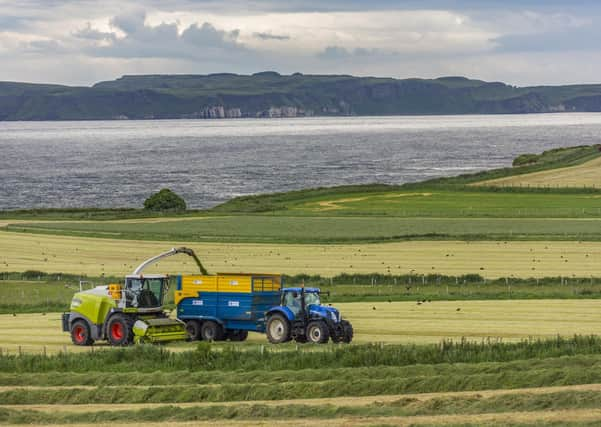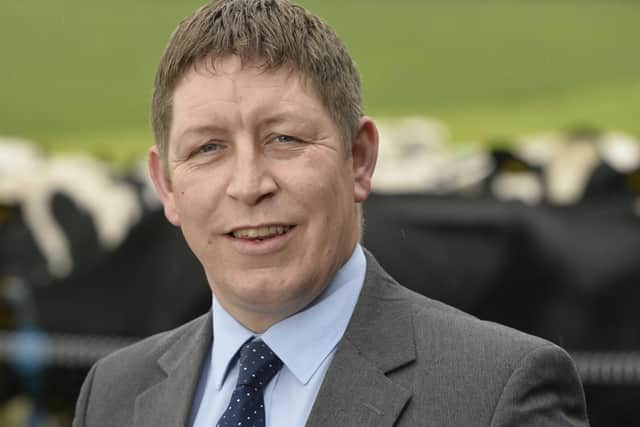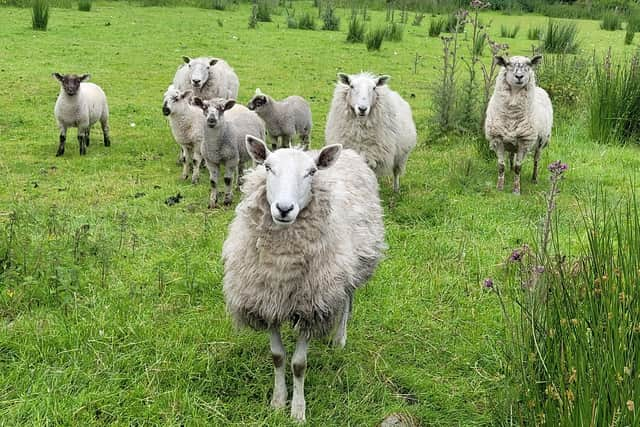There’s everything to play for asagriculture looks to the future


“Apart from that cold spell during April, the weather has played, very much, into farmers’ hands this year. Even on the Ards’ Peninsula, where soils are prone to drought, July’s dry spell did not impact to any great extent on either grass or crops growth rates,” Rodney confirmed.
“Farmers were able to get on with field work when they needed to. And even now, the weather is continuing to be a force for good. Grass is still growing and ground conditions continue to hold up.
Advertisement
Advertisement
“Any extension to the grazing season now shortens the winter, which serves to reduce farmers’ costs. Silage quality should also be good this winter. And this again, should help farmers to reduce their costs.”


So how is all of this good news impacting on the various sectors?
Dairy
According to the Danske Bank representative, milk prices have continued to rise. Demand is good and processors seem to be in a position to offer these prices.
He added:“But in terms of overall financial performance we have definitely seen costs rise. This leaves people in a net position which would not be that much different from this time last year.


Advertisement
Advertisement
“Turnovers have certainly increased. But costs have started to spiral out of control. Feed prices have increased by £10 to £15 per tonne over the past number of months. But we are now seeing that anything coming on to the farm is costing more.
“Machinery prices have soared and steel prices have risen around the world. Looking back on the out workings of the last Tier 2 grant application, which was processed back in May, we have seen a lot of the kit 2 that was ordered not being delivered on time.”
Beef
Where beef is concerned, Rodney immediately reflected on the significant uplift in prices that have been a feature of the market for the past number of months.
“Some farmers might say that it’s only now that they are starting to receive a fair price for their finished cattle,” he commented.
Advertisement
Advertisement
“Beef is hitting on £4/kg at the moment. There’s certainly demand in the market, whether that’s coming as a direct result of the protocol, I don’t know. But there is certainly a demand for red meat out there at the moment.”
But, as was also pointed out, beef is not a circular economy.
“There are not that many farmers out there, who take animals from birth through to finishing,” Rodney explained.
“We are now seeing very strong prices paid for live cattle in the marts. This confidence is based on the assumption that markets will remain buoyant. But there is no guarantee that this will happen.
Advertisement
Advertisement
“And, again, increasing feed costs are eating into the margins that finishers might hope to make this winter.”
Pigs and Poultry
And it’s a similar story, where pigs and poultry are concerned.
“Both sectors are doing well at the present time,” Rodney confirmed.
But as he also pointed out, it’s not all good news. All of Northern Ireland’s meat sectors are now reporting delaying in getting animals through their systems.
Advertisement
Advertisement
Specifically, where pigs are concerned, shortages of labour are starting to create delays when it comes to pigs being brought through to markets. Rodney Brown explained:“Whereas up to now farmers might have been able to get two loads of pigs away per week, this number might well have been reduced back to loads.
“At a very fundamental level, this is having a very negative impact on farm cash flows.
“But there are also associated welfare problems building up on farms. This is purely down to the fact that pig numbers are now backing up on farms in a very significant manner.”
He continued:“Pig returns will always be volatile. We saw a bit of a drop in pig prices at the beginning of this week. But, on the whole, the pig industry is faring well and our pig producers continue to do an excellent job.”
Arable
Advertisement
Advertisement
The Danske Bank representative believes that Northern Ireland’s cereal sector can look forward to a bright future.
He continued: “This year has seen local growers securing excellent yields of both grain and straw with prices for both on the rise.
“Anything that can be done to reduce our reliance on imported cereals and protein crops has to be welcomed.
“DAERA has pushed forward with a two-year pilot programme aimed at encouraging the production of protein crops here in Northern Ireland.
Advertisement
Advertisement
“Importing cereals has an immediate cost implication. But it is a practice that also adds to the carbon footprint of our farming sectors.”
Brexit
Rodney Brown traces the current shortfall of workers within the food processing sector – and the economy as a whole - to the exodus of many workers back to Eastern Europe in the direct aftermath of Brexit. He said:“The labour market is extremely tight out there at the moment. There is an element of picking and choosing as to where people actually work.
“So for a business to attract good labour, it needs to provide excellent working facilities and conditions.”
Significantly, the Danske Bank representative stressed that there are currently not enough workers available in the processing sector to cope with the numbers of animals backed up on farm at the present time.
Advertisement
Advertisement
He added:“This is not a Protocol-related issue. And, unfortunately, there is no short term fix for the problems that are now apparent.
“First and foremost it’s a case of working out how many animals we can process with the labour that is available.
“It’s then a case of re-winding this capacity figure back through the industry. Cattle processed today came into the production chain 18 plus months ago. In the case of pigs, we are talking six months, however decisions to bring these into the system were taken ten months ago.
“The long term solution to labour shortages within the food processing sector is robotics and automation. But this is a big step. And it will take a considerable investment to make this happen.
Advertisement
Advertisement
“The short term fix is to bring in workers from Eastern Europe.”
Farm finances and farm support
Despite the recent upturn in farm gate returns, Rodney Brown is quick to conform that the vast majority of farm business in Northern Ireland remain reliant on the single payment in order to remain viable.
He explained:“There is no way that agriculture could survive without that supplementary support coming into it.
“As we move forward there will be policy changes coming down the track. These will be much more climate focussed.
Advertisement
Advertisement
“In no way is it a case of farmers not earning the support available to the up to now. But looking ahead they will have to document more what they do in order to secure the subsidies that will be available.”
In terms of on-farm investment the Danske Bank representative said that many farmers are now positioning themselves to meet the environmental challenge that is on the horizon.
“This is why the likes of the Farm Business Improvement Scheme has been so well supported.
“There is also evidence to strongly suggest that many farmers availed of the government’s bounce bank loan scheme to invest in the new technologies that will help them reduce the carbon footprint of their businesses.
Advertisement
Advertisement
“Cash flow is remaining very strong on most farms. As a result, the demand that we would have usually seen to have overdrafts extended in the period running up to the distribution of the single payment monies is not as strong this year.
“Those farmers who have welcomed the good prices while, at the same time managing to control their costs, are doing really well at the present time.
“It gives me great heart that so many farmers are looking forward and are trying to drive real change within their businesses.”
The future
Rodney Brown believes that the overall support funding levels made available to agriculture into the future will be retained. But the ways by which the monies are actually made available to farmers certainly will change.
Advertisement
Advertisement
He commented:“For agriculture to remain sustainable, we just cannot take all that money out of the system. On that basis, I believe that overall funding levels will remain unchanged.
“Those that are picking up the environmental challenge will have more work to do in terms of meeting the targets set out for them.
“The money will be harder to access. There will perhaps be a parachute payment for those farmers who simply want to keep their business ticking over. But it will be greatly reduced, relative to the size of the single payment available at the moment.
“The bulk of the money will be made available to those farmers who set out down the road of meeting the environmental targets that they need to meet.
Advertisement
Advertisement
“Yes, there will still be a single payment of sorts made available to farmers. But it will possibly comprise a number of elements, which, for the most part, will reflect on the range of environmental improvements they make within their businesses.”
Given the current nature of the Protocol, Rodney also holds the view that whatever future farm support arrangements are agreed for Northern Ireland, they must also complement policy decisions taken in the rest of the UK and the Republic of Ireland.
Danske Bank
As an organisation Danske Bank is committed to leading from the front regarding its response to climate change. A case in point is its recent initiative to replace all lighting with ultra-low energy LED alternatives and, the installation of solar panels where feasible.
“We’ve made changes to our company car scheme so from 1st Jan next year only electric vehicles will be available under the scheme. This will mean that we will achieve our ambition of having a zero emission car fleet by 2025,” said Rodney.
Advertisement
Advertisement
“At present, we’re working though a schedule of boiler replacements removing older oil boilers so by the end of this year 80% of our standalone branches will be fossil fuel free.”
He added:
“We have signed the BITC Climate Pledge and committed to reducing our emissions by 50% by 2030 and in the last few weeks we have been awarded the Environmental Leadership award at the 2021 Business in the Community Responsible Business Awards.
In conclusion
Rodney Brown remains very confident that farming in Northern Ireland can look forward to very bright future.
“The future is carbon,” he stressed.
“And farmers will be expected to document this aspect of their business more comprehensively as they look to the future.
Advertisement
Advertisement
“The scope to improve efficiency levels on local farms is immense. So it should be more than feasible to retain our current levels of food output while meeting the challenge of climate challenge in a very sustainable manner.”